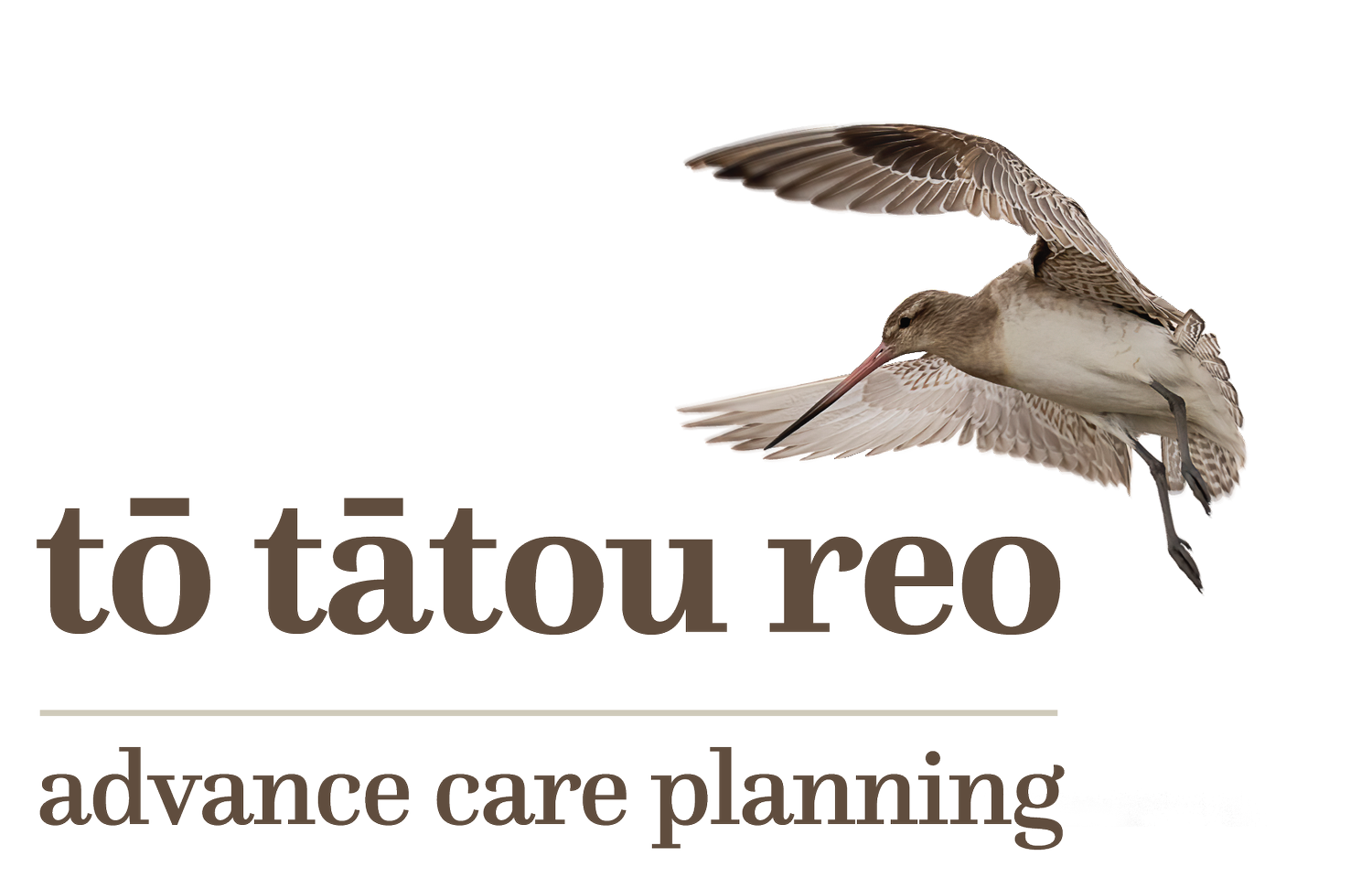Should I tell them I’m not Māori?
Research shows that Māori have inequitable access to tests, prescriptions, interventions and quality care compared with the rest of the population.
As part of a recent ‘Myth busting advance care planning’ webinar, Tō tātou Reo advance care planning Māori engagement manager Maarie Hutana explored why this continues and how we can use a cultural safety approach to place a person at the centre of their care.
You can watch the webinar and read more about it here:
Maarie Hutana (third from left) with the myth busting advance care planning cast and crew (from left): Jane Goodwin, Karlene Ward, Karla Olorenshaw, Sarah Marr, Chris Moore, Jenna Cook and Kate Grundy.
Introducing Daniel
As well as her work with the Tō tātou Reo advance care planning team, Maarie teaches the clinical application of Te Tiriti o Waitangi and cultural safety at the Ara Institute of Canterbury in Ōtautahi Christchurch in the Bachelor of Nursing programme.
As part of her presentation, Maarie spoke of Daniel, a patient she worked with in her last nursing role supporting whānau Māori affected by a blood cancer.
‘I supported Daniel through months of chemotherapy, radiation, a bone marrow transplant and consolidation treatment (a medication regimen to help his body accept the transplant). I was part of a larger team that helped him navigate the health system,’ she said.
‘I clearly recall the following conversation as Daniel was stepping into a chemotherapy session,’ she said. ‘Daniel had seen a clip on the news the night before, and it spoke of cancer and Māori. He said to me “Maarie, they said that Māori get cancer more often than pākehā, is that true?”
‘I replied, yes Daniel, that’s true.
‘He said “Maarie, they said that Māori get less tests and less medicines than pākehā, is that true too?”
‘I said, what else did they say, Daniel?’
“They said that Māori die of cancer way more than pākehā. Should I tell them I’m not Māori?”’
‘Daniel feared that, by being Māori, he would be treated differently and die,’ Maarie said.
What we can do about it
While we have talked about health inequities for decades, and a lot of good work has been done with policy, programmes of work, projects and initiatives, the evidence shows that Māori continue to have less access to care and receive poorer care throughout the full spectrum of health care services.
‘Māori are less likely to obtain answers to their health questions or receive explanations in understandable terms’, Maarie said.
‘How does this continue to happen and what can we do about it?’
Placing people at the centre of their care
Until recently, the Medical Council of New Zealand focused on cultural competency, which is about gathering information on different cultures and using this to inform your practice with people of that culture.
The shift to a cultural safety approach has occurred because cultural competency on its own has not effected change, Maarie said.
A cultural safety approach places the person at the centre of care. ‘They inform and define what quality of care means to them,’ she said.
A key element of this is reflective practice. ‘This requires you to turn a critical eye on yourself – to examine your own personal biases and assumptions so they don’t affect the quality of your work.’
‘In this way, reflective practice leads to enhanced self-awareness, different ways of decision-making and shifts in cultural norms and behaviours. The next step is to take action and commit to transformation,’ she said.
Examining and redressing power dynamics is another important aspect of a cultural safety approach.
‘Health professionals inherently hold the power in clinical relationships’, Maarie said. ‘When coupled with reflective practice, examination and redress of the power dynamic can lead to transformative change.’
Māori are not homogenous
The myth Maarie busted during the webinar was that Māori don’t like talking about death and dying.
‘Let’s unpack this. If this belief or assumption is held by health professionals, it can create unnecessary barriers to the access of advance care planning for whānau Māori.
‘This myth, or assumption, simply won’t be true for all Māori. Māori are not homogenous. Making assumptions that are based on ethnicity contributes to racial inequity that can stigmatise Māori. Normalising assumptions as truth can worsen health inequities by presenting them as inevitable,’ she said.
‘A cultural safety approach calls you to examine this assumption, placing the patient and their whānau at the centre of their care and asking, ‘would you like to think about advance care planning?’
What happened to Daniel
The last Maarie heard of Daniel was that he was doing well.
‘Following my discussion with him, I placed a critical reflective eye on myself and on the haematology service.
‘My commitment to transformational change included leading cultural safety workshops for the haematology workforce and supporting Daniel in an advance care planning process to ensure he had a voice in what quality care meant for him.’
Implementing a cultural safety approach is a way to ensure no one needs to ask, ‘should I tell them I’m not Māori?’ when accessing health care.
Continuing medical education
Watching the ‘Myth busting advance care planning’ webinar gives one continuing medical education point for medical professionals.
After watching the webinar you can download your certificate here: Myth busting advance care planning (myhealthhub.co.nz)

